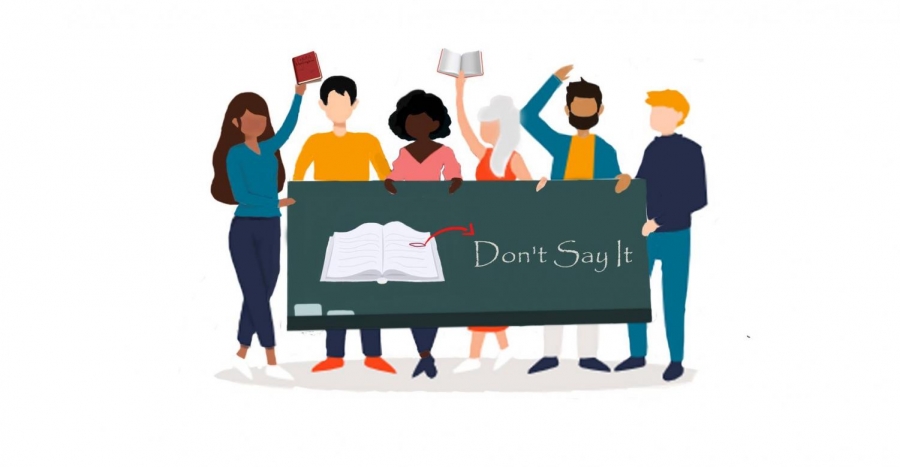The Exception to Academic Freedom
Drawn by Urmi Mandal. Some picture elements inspired by Freepik image by ‘pikisuperstar’
As classrooms become increasingly diverse, it’s essential to keep track of word choice in order to respect everyone’s experiences.
Some things are better left unsaid. This was a lesson that many students learned the second they read the pages of To Kill a Mockingbird. Like Harper Lee’s novel, many of the books discussed within high school classes cover controversial topics including slavery, discrimination, violence, and assualt. These texts tend to use graphic language and slurs to drive home the point of the passage. Some teachers explain that words like these deal with important issues, and academic freedom is necessary to have these difficult discussions with their classes. Despite this, within educational settings, the verbal use of ethnic, anti-LGBTQ+, and other discriminatory slurs should be avoided as they produce unequal learning opportunities for under-represented students and normalize the usage of the term by non-oppressed groups.
More often than not, when a slur is used, it creates a sense of discomfort. In the International Journal of Society, Wyman King wrote when referring to the n-word, “In a 2018 survey of 347 undergraduate students, 88 percent of whom identified as Black and 7 percent of whom identified as multi-racial, 76 percent believed it was never acceptable for a non-Black person to use the n-word in any situation”. If an oppressed group says that a slur makes them uncomfortable, it should not be said. So when slurs are used in an academic setting, they can cause discomfort for students of groups that the slur historically targeted, weakening student-teacher relations. A study by the University of Amsterdam found that teacher-student relationships are crucial as students grow older, and a degraded teacher-student relationship has a strong correlation with low engagement and worse performance in class. Minority groups tend to already have a disadvantage in educational settings within the US, and using slurs instead of euphemisms can further decrease their academic success.
When educators or students use slurs, even if they are using it in reference to a lecture or piece of work, it perpetuates the idea that it’s okay to say the slur as there are ‘exceptions’. Ta-Nehisi Coates, a writer at the Atlantic and author of We Were Eight Years in Power, points out that it is normal and accepted in our culture for some people or groups to use certain words that others can’t. For example, his wife calls him “honey”; it would not be acceptable, he said, for a stranger to do the same. Coates explains that the same logic applies to slurs, as its oppressive historical context will carry on into the classroom. Saying the word within classrooms to a diverse group of students reintroduces it into the vocabulary of students who are not part of those groups, and within, introduces its underlying connotations.
Nevertheless, some believe slurs in a strictly educational setting can be used as a method to prompt discussions about racism and injustice. When it comes to reading texts that contain slurs, many educators believe if the text doesn’t stir any emotion, discomfort included, it is not worth discussing. As Mrs. Hallford, AP Literature and Composition teacher at Irvington High School stated, “Orwell in 1984 saw the beginnings of [censoring] with the character Syme who, following BB’s dictates, began to rewrite the dictionary. Destroy the language, ban words, and you thereby reduce our ability to express ourselves, to deeply understand life, to critically think, to make change, to revolt, to take action, to tear down the walls that separate us.” While the idea that censorship can prevent students from truly understanding text rings true in certain cases, euphemisms for slurs help students understand the complicated history and context of a slur. They can feel the emotions of the text better than they would if it was uncensored, as it forces them to grasp why the word is being censored in the first place and the power that words can hold.
In the end, slurs, whatever the context, will always have a lasting effect when they are used. More often than not, they can make students uncomfortable, and as an effect, less inclined to learn within a classroom they feel uncomfortable, and if one can not enjoy learning, then the purpose of education is diminished. Hence, slurs stand as an exception to academic freedom.







